Author’s Note: I am going to be discussing various historical political leaders. I am not endorsing their policies or political viewpoints. I am not saying they are all good and admirable men. I am simply going to focus on one particular characteristic that they all share. In fact, while I admire some, others I despise, but they all demonstrated the ability to help their countries look beyond the moment, toward a better future.
If you follow the Main Stream Media idiots, you will think that Americans all hate President Donald Trump. The reality is that many people support him and find him to be a very good leader. That is not to say that these people blindly support every decision he makes, but simply that on the whole, they consider him to be effective.
Why? What makes him such an effective leader? I think it is his ability to inspire hope. In that, he joins a long list of great leaders from the past.
Consider Winston Churchill.
Here was a man who was ridiculed and side-lined, during the 1930s, by his cantakerous presentation of what he viewed as being most important – stopping Hitler. British leadership was filled with weak leaders during this time, exemplified by Neville Chamberlain. Now 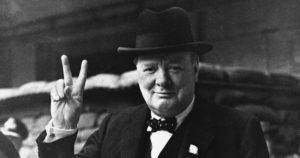 Chamberlain was a fine man, but not strong (That was Churchill’s opinion of him). Yet, when war came, it was Churchill who rallied his people to stand firm. Remember that from 1938-1940, Germany had taken over almost all of Western Europe, and the Soviets were not yet at war with the Nazis. France folded like a cheap suit, and the smaller countries had no chance. It was Britain alone who stood up to the brunt of the German onslaught.
Chamberlain was a fine man, but not strong (That was Churchill’s opinion of him). Yet, when war came, it was Churchill who rallied his people to stand firm. Remember that from 1938-1940, Germany had taken over almost all of Western Europe, and the Soviets were not yet at war with the Nazis. France folded like a cheap suit, and the smaller countries had no chance. It was Britain alone who stood up to the brunt of the German onslaught.
After watching the Hun’s war machine run roughshod over everything in their path, Chamberlain was out, and Churchill became Prime Minister. He told his people:
I would say to the House, as I said to those who have joined this government: “I have nothing to offer but blood, toil, tears and sweat.”
We have before us an ordeal of the most grievous kind. We have before us many, many long months of struggle and of suffering. You ask, what is our policy? I can say: It is to wage war, by sea, land and air, with all our might and with all the strength that God can give us; to wage war against a monstrous tyranny, never surpassed in the dark, lamentable catalogue of human crime. That is our policy. You ask, what is our aim? I can answer in one word: It is victory, victory at all costs, victory in spite of all terror, victory, however long and hard the road may be; for without victory, there is no survival. Let that be realised; no survival for the British Empire, no survival for all that the British Empire has stood for, no survival for the urge and impulse of the ages, that mankind will move forward towards its goal. But I take up my task with buoyancy and hope. I feel sure that our cause will not be suffered to fail among men. At this time I feel entitled to claim the aid of all, and I say, “come then, let us go forward together with our united strength.”
He became a rallying symbol for his people. He knew that the Germans would soon begin attacking Britain directly, and keep their spirits up during the Battle for Britain. After the rescue of troops from Dunkirk, he made “Their Finest Hour” speech, which included these  inspirational gems:
inspirational gems:
I indicated a fortnight ago as clearly as I could to the House that the worst possibilities were open; and I made it perfectly clear then that whatever happened in France would make no difference to the resolve of Britain and the British Empire to fight on, ‘if necessary for years, if necessary alone.” …
we have enormously improved our methods of defence, and we have learned what we had no right to assume at the beginning, namely, that the individual aircraft and the individual British pilot have a sure and definite superiority. Therefore, in casting up this dread balance sheet and contemplating our dangers with a disillusioned eye, I see great reason for intense vigilance and exertion, but none whatever for panic or despair….
If we are now called upon to endure what [the conquered countries] have been suffering, we shall emulate their courage, and if final victory rewards our toils they shall share the gains, aye, and freedom shall be restored to all. We abate nothing of our just demands; not one jot or tittle do we recede. Czechs, Poles, Norwegians, Dutch, Belgians have joined their causes to our own. All these shall be restored….
Let us therefore brace ourselves to our duties, and so bear ourselves that, if the British Empire and its Commonwealth last for a thousand years, men will still say, “This was their finest hour.”
In his “We Shall Fight Them On The Beaches” speech, he proclaimed:
Even though large tracts of Europe and many old and famous States have fallen or may fall into the grip of the Gestapo and all the odious apparatus of Nazi rule, we shall not flag or fail. We shall go on to the end. We shall fight in France, we shall fight on the seas and oceans, we shall fight with growing confidence and growing strength in the air, we shall defend our island, whatever the cost may be. We shall fight on the beaches, we shall fight on the landing grounds, we shall fight in the fields and in the streets, we shall fight in the hills; we shall never surrender, and if, which I do not for a moment believe, this island or a large part of it were subjugated and starving, then our Empire beyond the seas, armed and guarded by the British Fleet, would carry on the struggle, until, in God’s good time, the New World, with all its power and might, steps forth to the rescue and the liberation of the old.
And the result? The Brits did hold fast. They endured the German attacks, and with the help of the USA (who came along over 2 years after the war began in earnest), defeated Hitler and his army. Can you imagine Chamberlain keeping his people’s eyes on the prize? I can’t. Churchill encouraged and consoled them, and led them to victory, because he gave them hope for a better future.
How about Franklin Delano Roosevelt?
Look, I am not FDR fan. He was a Socialist who did much to bring long-term damage to the USA. But you cannot deny that he inspired people. First elected in 1932, in the first years of the Great Depression, he gave hope to a suffering people in his first inaugural address:
I am certain that my fellow Americans expect that on my induction into the Presidency I will address them with a candor and a decision which the present situation of our people impel. This is preeminently the time to speak the truth, the whole truth, frankly and boldly. Nor need we shrink from honestly facing conditions in our country today. This great Nation will endure as it has endured, will revive and will prosper. So, first of all, let me assert my firm belief that the only thing we have to fear is fear itself—nameless, unreasoning, unjustified terror which paralyzes needed efforts to convert retreat into advance. In every dark hour of our national life a leadership of frankness and vigor has met with that understanding and support of the people themselves which is essential to victory. I am convinced that you will again give that support to leadership in these critical days.
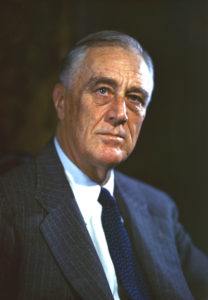 He began his “Fireside Chats” on the radio, to speak directly to his constituents. He addressed concerns and presented his policies. Here are a few examples:
He began his “Fireside Chats” on the radio, to speak directly to his constituents. He addressed concerns and presented his policies. Here are a few examples:
It is whispered by some that only by abandoning our freedom, our ideals, our way of life, can we build our defenses adequately, can we match the strength of the aggressors. … I do not share these fears….
[speaking about droughts] Yet I would not have you think for a single minute that there is permanent disaster in these drought regions, or that the picture I saw meant depopulating these areas. No cracked earth, no blistering sun, no burning wind, no grasshoppers, are a permanent match for the indomitable American farmers and stockmen and their wives and children who have carried on through desperate days, and inspire us with their self-reliance, their tenacity and their courage. It was their fathers’ task to make homes; it is their task to keep those homes; it is our task to help them with their fight….
I believe that we have been right in the course we have charted. To abandon our purpose of building a greater, a more stable and a more tolerant America would be to miss the tide and perhaps to miss the port. I propose to sail ahead. I feel sure that your hopes and I feel sure that your help are with me. For to reach a port, we must sail — sail, not lie at anchor, sail, not drift….
While concentrating on military victory, we are not neglecting the planning of the things to come, the freedoms which we know will make for more decency and greater justice throughout the world.
Among many other things we are, today, laying plans for the return to civilian life of our gallant men and women in the armed services. They must not be demobilized into an environment of inflation and unemployment, to a place on a bread line, or on a corner selling apples. We must, this time, have plans ready — instead of waiting to do a hasty, inefficient, and ill-considered job at the last moment.
I have assured our men in the armed forces that the American people would not let them down when the war is won.
And of course, his famous speech, where he called for a Declaration of War against Japan, is quite stirring:
Yesterday, December 7, 1941 a date which will live in infamy the United States of America was suddenly and deliberately attacked by naval and air forces of the Empire of Japan…
No matter how long it may take us to overcome this premeditated invasion, the American people in their righteous might will win through to absolute victory.
I believe that I interpret the will of the Congress and of the people when I assert that we will not only defend ourselves to the uttermost but will make it very certain that this form of treachery shall never again endanger us.
Hostilities exist. There is no blinking at the fact that our people, our territory, and our interests are in grave danger.
With confidence in our armed forces with the unbounding determination of our people we will gain the inevitable triumph so help us God.
I ask that the Congress declare that since the unprovoked and dastardly attack by Japan on Sunday, December 7, 1941, a state of war has existed between the United States and the Japanese Empire.
While he never really dealt with the Great Depression, he was able to convince Americans that he could. He inspired them. And he led the nation during the bulk of WWII. He gave them hope.
How About Ronald Reagan?
He is called “The Great Communicator” for a reason. Already a well-known actor, though never a top tier talent, Reagan became a household name for politics, starting in 1964, which is “A Time For Choosing” speech, offered in support of Barry Goldwater’s doomed run for the presidency. Here are a few snippets:
Not too long ago, two friends of mine were talking to a Cuban refugee, a businessman who had escaped from Castro, and in the midst of his story one of my friends turned to the other and said, “We don’t know how lucky we are.” And the Cuban stopped and said, “How lucky you are? I had someplace to escape to.” And in that sentence he told us the entire story. If we lose freedom here,
there’s no place to escape to. This is the last stand on earth.
Well, the trouble with our liberal friends is not that they’re ignorant; it’s just that they know so much that isn’t so.
You and I have a rendezvous with destiny.
We’ll preserve for our children this, the last best hope of man on earth, or we’ll sentence them to take the last step into a thousand years of darkness.
In his first inaugural address, he told us:
The economic ills we suffer have come upon us over several decades. They will not go away in days, weeks, or months, but they will go away. They will go away because we as Americans have the capacity now, as we’ve had in the past, to do whatever needs to be done to preserve this last and greatest bastion of freedom…
Well, I believe we, the Americans of today, are ready to act worthy of ourselves, ready to do what must be done to ensure happiness and liberty for ourselves, our children, and our children’s children. And as we renew ourselves here in our own land, we will be seen as having greater strength throughout the world….
I could go on and on, as Reagan was a veritable font of inspirational verbiage, whether it was to offer condolences for the Challenger explosion or to announce a new policy. His leadership brought the country out of the malaise of the Carter years, helped heal the divisions created by Watergate, and gave the American people a reason to hope again.
Now, about Donald Trump…
So we come to Trump. He is not the greatest speaker, but what he does say is appropriate and well-presented. He looked at the country’s 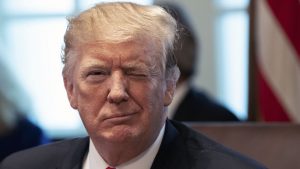 direction and saw some clear problems, including the economy and immigration. Those are the two big topics that he held up before the electorate in 2016, and this suggestions propelled him to the White House. Remember Obama’s admonition that all those manufacturing jobs were not coming back? He was wrong. Trump told us he was wrong, and sure enough, those jobs came back in droves.
direction and saw some clear problems, including the economy and immigration. Those are the two big topics that he held up before the electorate in 2016, and this suggestions propelled him to the White House. Remember Obama’s admonition that all those manufacturing jobs were not coming back? He was wrong. Trump told us he was wrong, and sure enough, those jobs came back in droves.
Remember Obama saying that we were now living in a new normal, and that unless Trump had a magic wand, he could not save the economy? Abracadabra, baby.
In his inaugural address, he encouraged Americans:
We, the citizens of America, are now joined in a great national effort to rebuild our country and to restore its promise for all of our people. Together, we will determine the course of America and the world for years to come. We will face challenges. We will confront hardships. But we will get the job done….
today we are not merely transferring power from one administration to another, or from one party to another — but we are transferring power from Washington, D.C. and giving it back to you, the American People….
What truly matters is not which party controls our government, but whether our government is controlled by the people. January 20th 2017, will be remembered as the day the people became the rulers of this nation again. The forgotten men and women of our country will be forgotten no longer.…
America will start winning again, winning like never before. We will bring back our jobs. We will bring back our borders. We will bring back our wealth. And we will bring back our dreams. We will build new roads, and highways, and bridges, and airports, and tunnels, and railways all across our wonderful nation. We will get our people off of welfare and back to work — rebuilding our country with American hands and American labor. We will follow two simple rules: Buy American and hire American.
And millions of Americans responded. Just as Churchill, FDR, and Reagan were able to offer hope, Trump has been able to get an apathetic American populace to consider that things might just get better. In that sense, he is a great leader. He offers us hope.
Now, things are not done. Trump has done well with the economy, but the immigration system is still broken, and his long-promised wall is still waiting to get built (what is going up now, in some places is a fence. We were promised a wall). If Trump is not able to accomplish his promises, we face the danger of America becoming even more jaded in the future. But the answer is simple: Build. The. Damn Wall.
Then we will know that our hope was not misplaced. If he does this, Trump will go down as one of the greatest Presidents in American History, and perhaps as one of the greatest of historical world leaders. He has the ability, as did these others, to inspire. He just needs to act on that hope that he has provided.



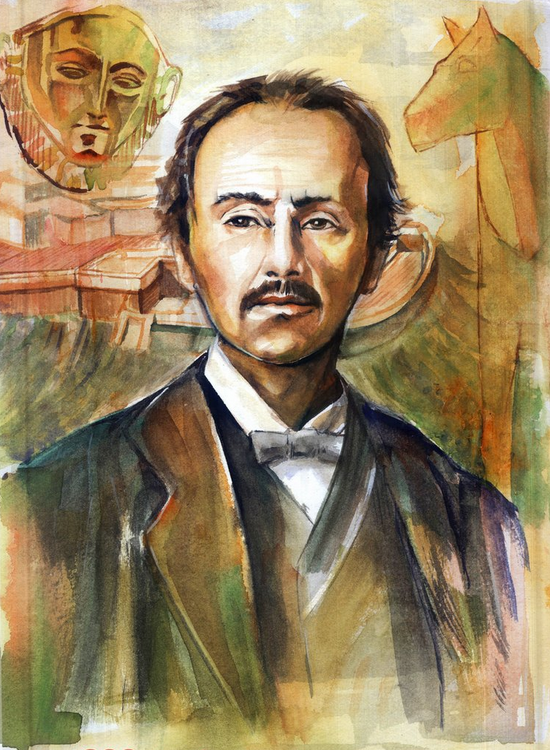
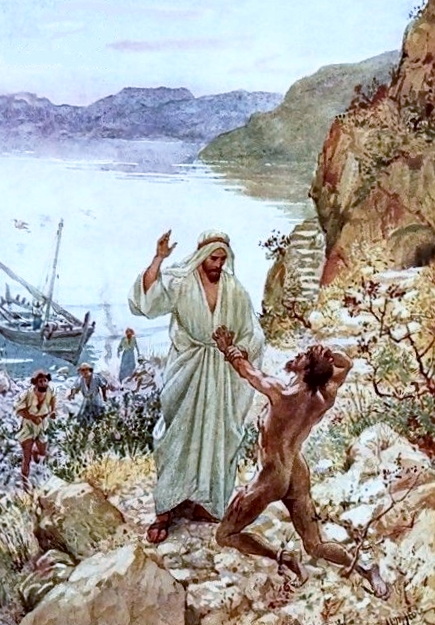





One of the terrible things that have been lost in modern discussion is the inability to recognize the strengths of certain historical leaders. As you aptly point out with FDR, numerous reasons to not like the old fellow, but you have to recognize he was a leader of men. The wisdom one learns from reading about the men of old and their lives is thrown aside far too often these days as “bad-think”…on both the left and right, sadly. Glad you point this out.